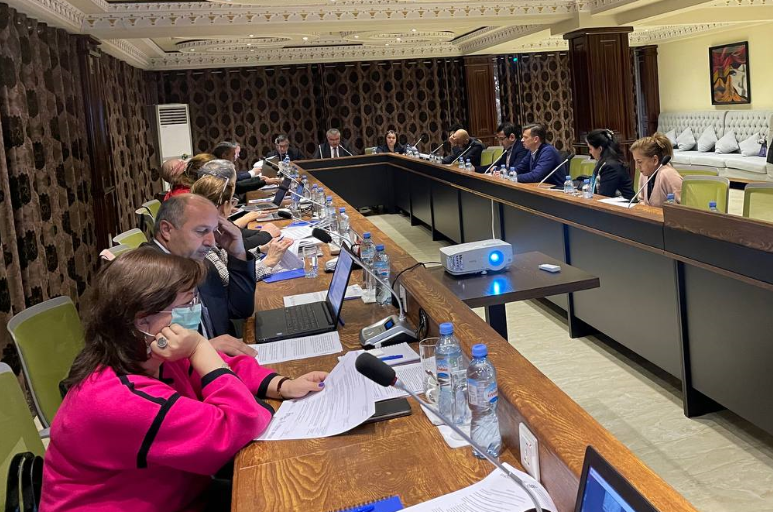On December 9, the Regional Expert Group on Migration and Health together with the Secretariat of the National Coordination Committee to fight AIDS, TB and Malaria of the Republic Of Tajikistan held a Round table “Protection of health of migrants from Tajikistan” in Dushanbe.
The event was timed to the presentation of a new study conducted by the REG: “Situation and Economic analysis of HIV-related health services in the field of migration in Tajikistan”. The purpose of the meeting was to present the results of the study and discuss evidence-based arguments of presented data with decision makers, representatives of civil society, academic and international organizations. Both Research and the Round Table was organized within the framework of the Global Fund project “Sustainability of Services for Key Populations in Eastern Europe and Central Asia region”.
Navruz Jafarov, Head of Sanitary and Epidemiological Security Department of the Ministry of Health of the Republic of Tajikistan, opening the event, said: “The issue of migrants’ health was not included in country’s applications to the Global Fund in the past years. We need to pay more attention to this topic. It is important to focus on the vulnerability of migrants to HIV, and the Ministry of Health understands it. We hope that the study will be the starting point for the preparation of the Global Fund new proposal. It is necessary that national activities in the area of migration and HIV are coordinated, and the role of the National Coordinating Mechanism is very important here. In the future, given that there were previously many undiagnosed cases among migrants, it is very important to strengthen this work.”
Alijon Soliev, Deputy Director of the Republican AIDS Center of Tajikistan, presented a new Regulation on remote registration of citizens with HIV living abroad. The document was signed by the Ministry of Health and published. Now citizens of Tajikistan, who have been diagnosed with HIV abroad and who are not able to return to the country for treatment at the moment, are able to register at the AIDS Centers of Tajikistan remotely by providing necessary documents electronically – a copy of passport and results of medical tests.
The strategy of remote medical care has been actively discussed and developed throughout the region of Eastern Europe and Central Asia, and Tajikistan is adapting this best practice in providing HIV care to their citizens residing abroad.
Remote registration of citizens with HIV helps to simultaneously solve a large number of issues:
• Migrants living with HIV receive timely treatment and remain healthy,
• Migrants living with HIV who take antiretroviral therapy and have a suppressed viral load reduce the risk of HIV transmission to their partner, thereby ceasing to spread HIV in the receiving country,
• When returning to the country of origin, migrants do not transmit HIV to their partners, hence the spread of HIV in the country of origin among migrants and their families is under control,
• People with HIV who receive timely ART in most cases do not develop HIV-associated diseases, they do not end up in emergency care either in the receiving country or when they return to Tajikistan, as a result, there are budget savings in both countries.
During the Roundtable, participants agreed to establish an intersectoral working group on migrant health in order to coordinate efforts in developing programs for prevention and protection of health of Tajik citizens living abroad or planning to migrate soon.
